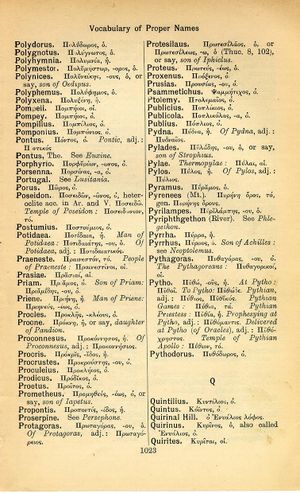Protagoras: Difference between revisions
From LSJ
Ἡ γὰρ σιωπὴ τοῖς σοφοῖσιν ἀπόκρισις → Silentiumque sapienti est responsio → Denn Schweigen ist für Weise deutlicher Bescheid
(Names) |
(6_13) |
||
| Line 3: | Line 3: | ||
<b class="b2">Of Protagoras</b>, adj.: [[Πρωταγόρειος]]. | <b class="b2">Of Protagoras</b>, adj.: [[Πρωταγόρειος]]. | ||
}} | |||
{{Lewis | |||
|lshtext=<b>Prōtăgŏras</b>: ae, m., = Πρωταγόρας,<br /><b>I</b> a [[celebrated]] [[sophist]] of [[Abdera]], a [[disciple]] of [[Democritus]], and an [[older]] [[contemporary]] of [[Socrates]]; he [[was]] [[banished]] from [[Athens]] on a [[suspicion]] of atheism, Cic. N. D. 1, 1, 2; 1, 23, 63; id. Ac. 2, 46, 142; id. Brut. 8, 30; 12, 46; Gell. 5, 3, 1 sqq.—Hence, Prōtăgŏrīon, ĭi, n., = Πρωταγόρειον, a [[dictum]] or [[maxim]] of [[Protagoras]], Gell. 5, 11, 1. | |||
}} | }} | ||
Revision as of 08:54, 13 August 2017
English > Greek (Woodhouse)
Πρωταγόρας, -ου, ὁ.
Of Protagoras, adj.: Πρωταγόρειος.
Latin > English (Lewis & Short)
Prōtăgŏras: ae, m., = Πρωταγόρας,
I a celebrated sophist of Abdera, a disciple of Democritus, and an older contemporary of Socrates; he was banished from Athens on a suspicion of atheism, Cic. N. D. 1, 1, 2; 1, 23, 63; id. Ac. 2, 46, 142; id. Brut. 8, 30; 12, 46; Gell. 5, 3, 1 sqq.—Hence, Prōtăgŏrīon, ĭi, n., = Πρωταγόρειον, a dictum or maxim of Protagoras, Gell. 5, 11, 1.

